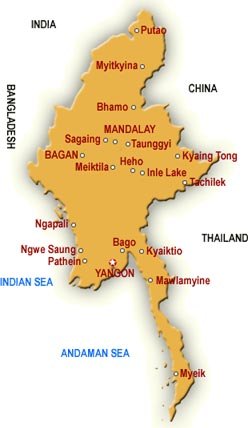Myanmar's referendum to "approve" constitution set for May 10
Yangon -  Myanmar's ruling junta will hold a national referendum on May 10 "enabling the people to approve" a new constitution that promises to institutionalize the military's dominant role in future governments, state media said Thursday.
Myanmar's ruling junta will hold a national referendum on May 10 "enabling the people to approve" a new constitution that promises to institutionalize the military's dominant role in future governments, state media said Thursday.
The Commission for Holding Referendum decided on the May 10 date in a meeting held Wednesday in the military's new capital of Naypyitaw, said The New Light of Myanmar, a government mouthpiece newspaper.
"In accord with the decision of the meeting, it is hereby announced that the referendum will be held on 10 May 2008 for enabling the people to approve the draft constitution of the Republic of the Union of Myanmar," said a statement issued by Chief Justice Aung Toe, who presided over the meeting.
Although eligible voters will be allowed to vote yes or no for the new constitution, government statements have made it clear that the junta sees the referendum as a means of "approving" the new charter.
In February, the junta issued a new law threatening anyone who publicly criticizes the referendum with three years imprisonment and a fine.
It took 14 years for a military-appointed forum to draft the principles for Myanmar's new draft constitution, which will essentially legitimize the military's dominant role in any future government.
Under the draft charter, 110 members of 440-seat lower house, or People's Parliament, and 56 members of the 224-seat upper house, or National Parliament, will be selected by the military.
This 25 per cent control over both houses will effectively bar amendments to the charter that might threaten the military's dominance, observers have noted.
For an amendment to pass, it would require over 75 per cent support of parliament.
Despite government pressure on the Myanmar people to approve the draft constitution on May 10, there is a growing campaign to vote against it, led by the National League for Democracy (NLD) opposition party which is headed by Nobel Peace Prize laureate Aung San Suu Kyi.
But it is unclear whether the "vote no" campaign will be effective in the countryside.
"It will be difficult for the message to reach the villages, but one thing in its favour is that last September's demonstrations made many people in the villages frustrated with the government, so their anger may also make them vote no," said Win Min, a Thailand-based Myanmar political analyst.
Last September, thousands of people took to the streets of Yangon, the former capital, in monk-led anti-government demonstrations that were sparked by rising fuel prices and deteriorating economic conditions.
The army crushed the demonstration on September 25 to 26, leaving at least 31 people dead. The crackdown, especially the attacks on Buddhist monks, further embittered many against the military, which has ruled the country since 1962. (dpa)